 Petzlover
Petzlover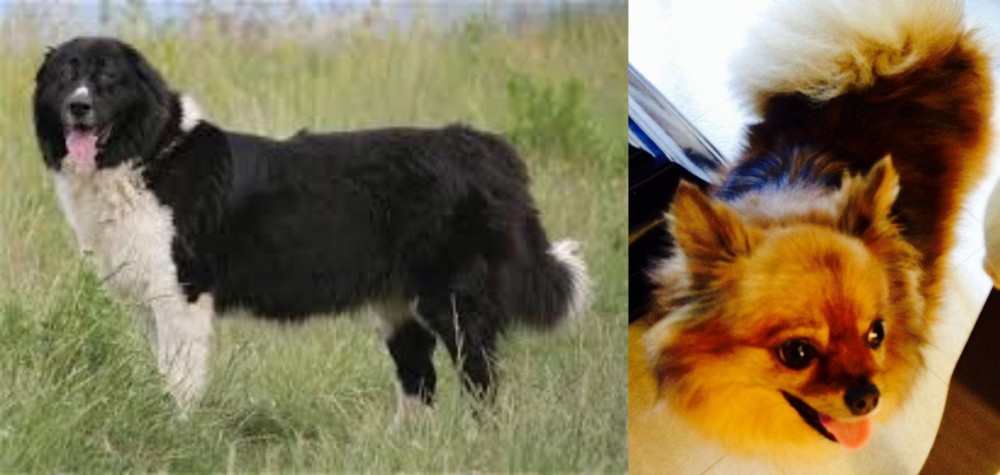 Bulgarian Shepherd is originated from Bulgaria but Chiapom is originated from United States. Bulgarian Shepherd may grow 50 cm / 20 inches higher than Chiapom. Bulgarian Shepherd may weigh 49 kg / 109 pounds more than Chiapom. Bulgarian Shepherd may live 39 years more than Chiapom. Bulgarian Shepherd may have more litter size than Chiapom. Both Bulgarian Shepherd and Chiapom requires Moderate Maintenance.
Bulgarian Shepherd is originated from Bulgaria but Chiapom is originated from United States. Bulgarian Shepherd may grow 50 cm / 20 inches higher than Chiapom. Bulgarian Shepherd may weigh 49 kg / 109 pounds more than Chiapom. Bulgarian Shepherd may live 39 years more than Chiapom. Bulgarian Shepherd may have more litter size than Chiapom. Both Bulgarian Shepherd and Chiapom requires Moderate Maintenance.
 The Bulgarian Shepard Dog comes from the ancient line of Molossers of Central Asia and Tibet, and the shepherds of the Balkans, Turkey and Caucasus. Among the oldest and most valued of the working dogs of Europe, the Bulgarian Shepherd breed was created by mixing the Balkan breeds with the dogs from Central Asia by the proto-Bulgarians around the 7th century. The Karakachanskoto Kuche was introduced to Bulgaria and accepted by the sheep herders. Mixing this breed in with the Balkan and Central Asian mix developed the Bulgarian Shepherd we know today. In the long run the original Karakachanskoto Kuche became extinct, replaced entirely by the Bulgarian Shepherd even in places where the new breed is still called by the Kuche name. Although the breeds are not the same, most of the dog world does not know the difference.
The Bulgarian Shepard Dog comes from the ancient line of Molossers of Central Asia and Tibet, and the shepherds of the Balkans, Turkey and Caucasus. Among the oldest and most valued of the working dogs of Europe, the Bulgarian Shepherd breed was created by mixing the Balkan breeds with the dogs from Central Asia by the proto-Bulgarians around the 7th century. The Karakachanskoto Kuche was introduced to Bulgaria and accepted by the sheep herders. Mixing this breed in with the Balkan and Central Asian mix developed the Bulgarian Shepherd we know today. In the long run the original Karakachanskoto Kuche became extinct, replaced entirely by the Bulgarian Shepherd even in places where the new breed is still called by the Kuche name. Although the breeds are not the same, most of the dog world does not know the difference.
In Bulgaria however the Karakachan is a national treasure and the history of the breed runs deep. One Kuche could run up to 1200 animals and hundreds were used by the herdsmen in the mountains of Bulgaria. There were many regional types of Bulgarian Shepherds with very little difference between those types. These dogs were so prized by the shepherds that the dogs ate first before the people. The dogs however ate a vegetarian diet of milk, wheat, water and oats. The Bulgarian Shepherd lives a long life of often over 20 years. The Bulgarian Army made good use of these dogs early in the 20th century.
Following World War II, the wolves were close to extinction and property in Bulgaria was nationalized. There was no longer a need for a large force of working dogs. The Communist government exterminated large numbers of sheep dogs including the Bulgarian Shepherd. Only those species on government owned farms and in remote regions survived. When the government farms were disbanded in the early 20th century, these dogs were exterminated as well. Only those in the mountains survived. Commercial breeding of the Bulgarian Shepherd in the end of the century has resulted in controversy as other breeds came into the breeding program.
Use of breeds such as Sarplaninacs, Caucasian Ovcharkas, St. Bernards, Central Asian Ovcharkas and Bosnian Tornjaks in these programs resulted in Bulgarian Shepherd or Karakachans that were a lot different from the original breed. There is therefore some concern about the future of the breed in Bulgaria, yet they received official Bulgarian national recognition in 2000. Today’s Bulgarian Shepherd is a guard dog for both property and livestock.
The official standard for the breed came about in 1991 and in 2005 it was recognized by the Bulgarian State Commission for Animal Breeds. Only those dogs that meet this standard are considered “true” Karakachans. The Bulgarian Shepherds are willing to fight bears and wolves in defense of its family and flock. The dog is brave and loyal, dignified and powerful. They are recognized by both the Dog Registry of America, Inc. (DRA) and the Bulgarian Republican Federation of Cynology (BRFC) a member of the FCI.
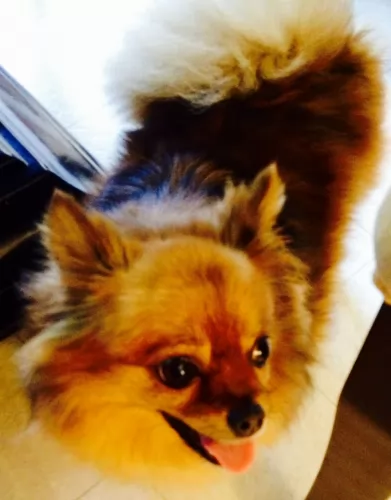 The Chi-Pom or Chiapom comes from mixing the Pomeranian and the Chihuahua, and both these dogs are toy breeds and known as companion dogs.
The Chi-Pom or Chiapom comes from mixing the Pomeranian and the Chihuahua, and both these dogs are toy breeds and known as companion dogs.
These little dogs each have their own individual histories, but but being a cross breed, the Chi-Pom’s history isn’t well documented particularly well.
Nobody seems to know precisely when this new dog breed came into being, but they were first bred in the United States.
 A massive, powerful and muscular Molosser, the Bulgarian Shepherd is strong, agile, powerful and fast. They are intelligent and reliable. They have a long, thick, harsh coat in white with patches of black. Their skull is massive and broad with a furrowed forehead. The muzzle is massive as well while the nose has wide nostrils and is fairly large. It has close fitting, thick lips with strong, scissor bite jaws. The Bulgarian Shepherd’s eyes are deep, oblique and small. They are either hazel or dark. They have an intelligent and confident, yet firm almost grim expression.
A massive, powerful and muscular Molosser, the Bulgarian Shepherd is strong, agile, powerful and fast. They are intelligent and reliable. They have a long, thick, harsh coat in white with patches of black. Their skull is massive and broad with a furrowed forehead. The muzzle is massive as well while the nose has wide nostrils and is fairly large. It has close fitting, thick lips with strong, scissor bite jaws. The Bulgarian Shepherd’s eyes are deep, oblique and small. They are either hazel or dark. They have an intelligent and confident, yet firm almost grim expression.
Their ears are low set, small and v-shaped. They sit close to the head which sits on a powerful but short neck. They have a broad back, well-muscled body with a deep chest and long, rough tail. Their gait is a trot with a spring in their step. There are two types of coats – longhaired and shorthaired with no undercoats.
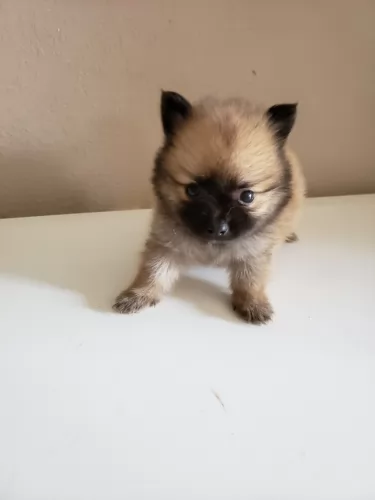 The Chi-Pom or Chiapom isn’t a pure bred dog, but a cross between the Chihuahua and the Pomeranian. This toy breed’s coat can be shortish like the Chihuahua or feathery and medium to long like with the Pomeranian, and the coat will be soft and shiny.
The Chi-Pom or Chiapom isn’t a pure bred dog, but a cross between the Chihuahua and the Pomeranian. This toy breed’s coat can be shortish like the Chihuahua or feathery and medium to long like with the Pomeranian, and the coat will be soft and shiny.
He has pointed ears, much like a fox, and the long tail is carried upward and curls over the back. The coat can be a solid color such as white, tan, cream, fawn, brown or gray, with the most common color being light brown.
If he takes more after the Pomeranian, he may need to have his hair cut. The typical Pomchi dog’s head is more round that the Pomeranian but with the narrow muzzle. The eyes are large and dark.
The Chiapom is a small dog that measures just 15 – 25cm in height and weighs between 2 and 8kg.
Pomchis are intelligent and inquisitive, having a temperament which comes from either of the two breeds which are quite similar.You’re definitely going to have an entertaining little dog, one who is energetic, curious and alert.
He isn’t a good choice with small children as he gets nervous and aggravated when handled improperly. Nervous and hurt, he may nip and then often he gets the blame, whereas he just shouldn’t have to put up with small children.
He loves to be in the company of his human family who treat him well, and he doesn’t like to be left alone. He is an intelligent little dog and is eager to learn. Therefore, even though he is small, training and socialization will be good for him and give him an even more amicable disposition.
 This is a working dog, intelligent and independent guard dog. Reserved around strangers but loyal and devoted with his family. Tolerant of children in their family if they were raised with them. Not only will she defend human family members, she will guard and defend household pets as well. He is quite capable of making her own independent decisions. These are very intense guard dogs that will respond aggressively if they think their people are being attacked.
This is a working dog, intelligent and independent guard dog. Reserved around strangers but loyal and devoted with his family. Tolerant of children in their family if they were raised with them. Not only will she defend human family members, she will guard and defend household pets as well. He is quite capable of making her own independent decisions. These are very intense guard dogs that will respond aggressively if they think their people are being attacked.
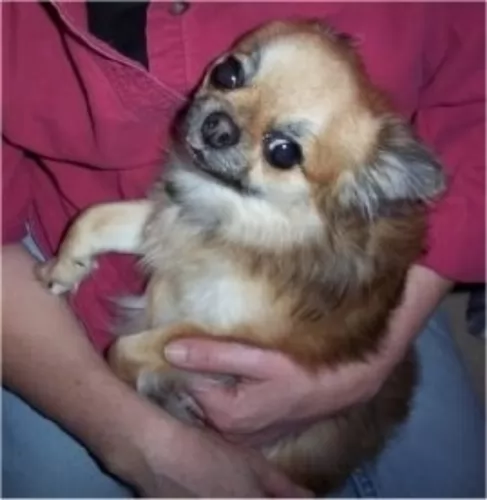 Crossing two breeds of dog is the in-thing these days, and its not surprising that lovers of small breed dogs would think to mix the Chihuahua and the Pomeranian.
Crossing two breeds of dog is the in-thing these days, and its not surprising that lovers of small breed dogs would think to mix the Chihuahua and the Pomeranian.
The Chiapom is affectionate, playful and good-natured with their human family. They are full of personality, are spunky and brave, believing they can protect their families. He may be too frail for this but he alerts you to danger with his barking.
With the Chiapom, you’re going to have an awesome little friend who will stand by you in thick and thin.
 The breed itself is known to be healthy but they do face some of the usual health issues of the massive, giant breeds. This includes knee and elbow dislocation; hip dysplasia; bloat; entropion and osteosarcoma. All of these conditions require medical intervention, but bloat and osteosarcoma are the deadliest. Bloat needs immediate attention and osteosarcoma is a deadly bone cancer.
The breed itself is known to be healthy but they do face some of the usual health issues of the massive, giant breeds. This includes knee and elbow dislocation; hip dysplasia; bloat; entropion and osteosarcoma. All of these conditions require medical intervention, but bloat and osteosarcoma are the deadliest. Bloat needs immediate attention and osteosarcoma is a deadly bone cancer.
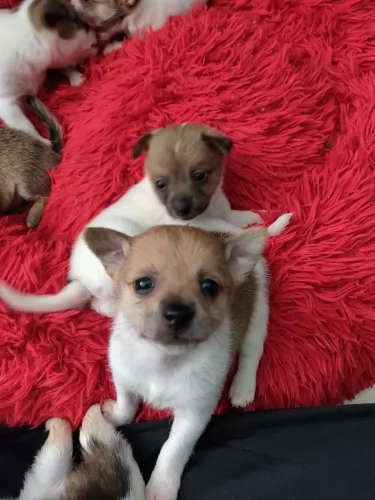 Being a cross bred, the Chiapom will be healthier than the purebred Chihuahua or Pomeranian. He is full of personality, but sometimes he can have his fair share of doggy troubles too.
Being a cross bred, the Chiapom will be healthier than the purebred Chihuahua or Pomeranian. He is full of personality, but sometimes he can have his fair share of doggy troubles too.
He is more prone to injuries just because he gets under your feet all the time. We look at one or two health issues with this small breed that you should be aware of -
This is an ailment which can be found in all dogs but it occurs more in smaller dogs. An inflamed pancreas from trauma, infection or a metabolic disorder can mean your little dog vomiting, being uncomfortable with stomach pain and shivering.
This is a disease which involves the trachea which is also known as the windpipe. When the windpipe weakens, it becomes difficult to breath. Obesity in your pet as well as dust and kennel cough can contribute to this ailment.
 These are large dogs with large appetites, but you want to keep them lean and active. Feed them at least twice a day with a high quality large or giant dog dry food. Four to five cups of food per day is the maximum.
These are large dogs with large appetites, but you want to keep them lean and active. Feed them at least twice a day with a high quality large or giant dog dry food. Four to five cups of food per day is the maximum.
Patellar Luxation – a floating kneecap or dislocated knee. Will cause lameness.
Osteosarcoma – bone cancer must be treated immediately as it is potentially fatal.
The Bulgarian Shepherd needs a good amount of exercise every day. Remember this is a working breed and they need a job. Long walks every day are essential for his well-being.
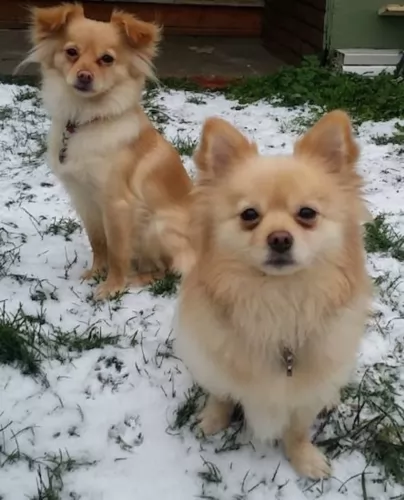 The Pomchi is a small dog who is looked upon essentially as an indoors dog, so it is quite able to adapt to apartment living as he won’t require large doses of exercise.
The Pomchi is a small dog who is looked upon essentially as an indoors dog, so it is quite able to adapt to apartment living as he won’t require large doses of exercise.
With some stimulating toys, he is able to exert energy indoors and will love to chase a ball down the passage. He certainly won’t do well in cold weather and being left outdoors.
The Chiapom often has the longer hair of the Pomeranian so it becomes necessary to give your little dog a good brush twice a week for the hair to remain tangle-free and to keep it shiny and silky.
You’ll notice with your Pomchi that he could possibly have overactive tear ducts so that they have a discharge. A small damp cloth can be used to wipe his eyes.
Small breed dogs often require more calories than larger dogs because of their higher metabolic rates. He is a small dog that will require all the right vitamins and minerals.
Commercial dog foods are certainly convenient, and the best quality ones contain the nutrients a dogs needs to remain health. It is always beneficial for your 4-legged friend if you can include some brown rice, a little bit of cooked chicken and vegetables in his diet. However, if you are uncertain about the nutrition requirements of your pet, speak to your vet and get help with a food that caters for your dog’s age, breed and activity levels.